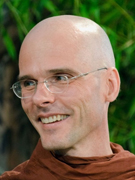Anālayo: Difference between revisions
No edit summary |
No edit summary |
||
| Line 1: | Line 1: | ||
{{Person | {{Person | ||
|HasDrlPage=Yes | |||
|HasLibPage=Yes | |||
|HasBnwPage=Yes | |||
|pagename=Anālayo | |pagename=Anālayo | ||
|PersonType=Authors of English Works; Ordained (Monks and Nuns) | |PersonType=Authors of English Works; Ordained (Monks and Nuns) | ||
|images=File:Analayo Hamburg.JPG | |images=File:Analayo Hamburg.JPG | ||
|MainNamePhon=Bhikkhu Anālayo | |MainNamePhon=Bhikkhu Anālayo | ||
|addresslocation=Universität Hamburg | |addresslocation=Universität Hamburg | ||
| Line 11: | Line 11: | ||
|yearbirth=1962 | |yearbirth=1962 | ||
|bornin=Germany | |bornin=Germany | ||
|bio=Bhikkhu Anālayo was born in Germany in 1962 and ordained in Sri Lanka in 1995. In the year 2000 he completed a Ph.D. thesis on the Satipatthana-sutta at the University of Peradeniya (published by Windhorse in the UK). In the year 2007 he completed a habilitation research at the University of Marburg, in which he compared the Majjhima-nikaya discourses with their Chinese, Sanskrit, and Tibetan counterparts. At present, he is a member of the Numata Center for Buddhist Studies, University of Hamburg, as a professor, and works as a researcher at Dharma Drum Institue of Liberal Arts, Taiwan. Besides his academic activities, he regularly teaches meditation. ([https://www.buddhismuskunde.uni-hamburg.de/en/personen/analayo.html Source | |bio=Bhikkhu Anālayo was born in Germany in 1962 and ordained in Sri Lanka in 1995. In the year 2000 he completed a Ph.D. thesis on the Satipatthana-sutta at the University of Peradeniya (published by Windhorse in the UK). In the year 2007 he completed a habilitation research at the University of Marburg, in which he compared the Majjhima-nikaya discourses with their Chinese, Sanskrit, and Tibetan counterparts. At present, he is a member of the Numata Center for Buddhist Studies, University of Hamburg, as a professor, and works as a researcher at Dharma Drum Institue of Liberal Arts, Taiwan. Besides his academic activities, he regularly teaches meditation. ([https://www.buddhismuskunde.uni-hamburg.de/en/personen/analayo.html Source accessed Nov 22, 2019]) | ||
* For a substantial list of Bhikkhu Anālayo's publications, visit his faculty page at the [https://www.buddhismuskunde.uni-hamburg.de/en/personen/analayo.html University of Hamburg] | * For a substantial list of Bhikkhu Anālayo's publications, visit his faculty page at the [https://www.buddhismuskunde.uni-hamburg.de/en/personen/analayo.html University of Hamburg] | ||
| Line 22: | Line 22: | ||
|classification=People | |classification=People | ||
}} | }} | ||
{{Footer}} | {{Footer}} | ||
Revision as of 17:48, 13 July 2020
| PersonType | Category:Authors of English Works Category:Ordained (Monks and Nuns) |
|---|---|
| MainNamePhon | Bhikkhu Anālayo |
| bio | Bhikkhu Anālayo was born in Germany in 1962 and ordained in Sri Lanka in 1995. In the year 2000 he completed a Ph.D. thesis on the Satipatthana-sutta at the University of Peradeniya (published by Windhorse in the UK). In the year 2007 he completed a habilitation research at the University of Marburg, in which he compared the Majjhima-nikaya discourses with their Chinese, Sanskrit, and Tibetan counterparts. At present, he is a member of the Numata Center for Buddhist Studies, University of Hamburg, as a professor, and works as a researcher at Dharma Drum Institue of Liberal Arts, Taiwan. Besides his academic activities, he regularly teaches meditation. (Source accessed Nov 22, 2019)
|
| YearBirth | 1962 |
| BornIn | Germany |
| affiliation | Numata Center for Buddhist Studies, University of Hamburg |
| affiliationsecondary | Dharma Drum Institute of Liberal Arts, Taiwan |
| religiousaffiliation | Theravada |
| phduniversity | University of Peradeniya, Sri Lanka |
| publications | For a substantial list of Bhikkhu Anālayo's publications, visit his faculty page at the University of Hamburg |
| IsInGyatsa | No |
| Other wikis |
If the page does not yet exist on the remote wiki, you can paste the tag |

